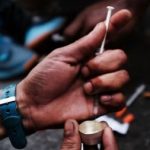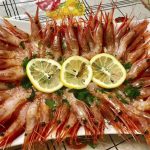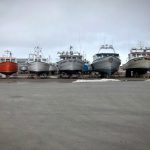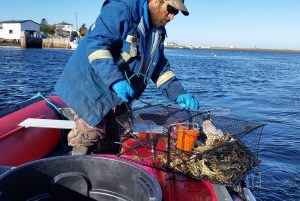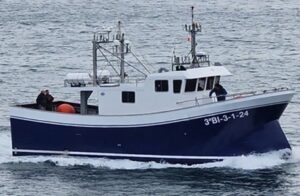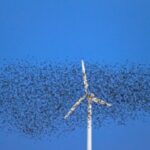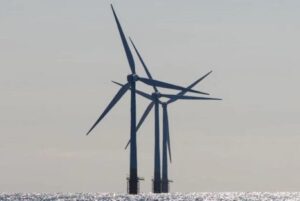Dewey Hemilright: U.S.Fishermen in desperate need to level playing field in U.S. marketplace
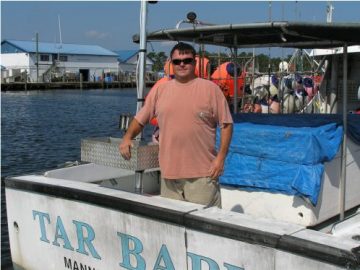 The U.S.A is a member of ICCAT which is the International body with 53 contracting party countries {CPC}with additional 6 countries having cooperating status that manages Highly Migratory species in the Atlantic Ocean such as Swordfish, {BAYS TUNA} Bigeye, Bluefin, Yellowfin, Skipjack, True albacore, Blue marlins, white marlins ,sailfish, roundscale spearfish and some pelagic shark species including short-fin mako shark and blue shark.
The U.S.A is a member of ICCAT which is the International body with 53 contracting party countries {CPC}with additional 6 countries having cooperating status that manages Highly Migratory species in the Atlantic Ocean such as Swordfish, {BAYS TUNA} Bigeye, Bluefin, Yellowfin, Skipjack, True albacore, Blue marlins, white marlins ,sailfish, roundscale spearfish and some pelagic shark species including short-fin mako shark and blue shark.
ICCAT has a {SCRS}, which stands for {standing committee on research statistics}, this group gives scientific recommendation for harvest amount and it is based on stock assessments results preformed by the SCRS. Once this recommendation is presented it gives the level of sustainable harvest to be taken, then the quota is divided among regions and historical allocations percentage, but the {SCRS} recommendation for catch limits are often exceeded depending on certain {CPC}with certain species and with gears fished.
I attended as a member of U.S.A. delegation in November 15-25 ,2019 the 26th annual meeting of ICCAT in Mallorca, Spain.
Here’s what the landscape looked like for 2018 reported landings among CPC’s to ICCAT and the U.S. percentages and pounds harvested and under-harvested.
In the past for north Atlantic Big eye tuna the SCRS recommended a yearly harvest of 65,000 metric tons or 143,260,00 pounds. But in reality the five year avg. of reported landings came in at 78,000 metric tons or 171,912,000 pounds, which was 13,000 metric tons or 28,652,000 pounds above the recommended sustainable harvest.
Keep in mind in 2018 the U.S is less than 1.5% of this total in its harvest of Bigeye tuna for both recreational and commercial at 921 mt or 2,029,597 pounds and it stayed under the 1575 mt or 3,471,300 pounds landing threshold allowed.
In the catch of Atlantic Yellowfin tuna the U.S. harvest includes both recreational and commercial in 2018 was 5,950,800 pounds, which is less than 2% of the ICCAT reported total catch of 299,058,556 pounds.
In the catch of north Atlantic Swordfish the U.S. has a ICCAT adjusted quota allocation of 4,493 mt or 9,902,682pounds of which the U.S., in 2018, only harvested 1279 mt or 2,818,916. So the U.S. left 7,083,766 pound of its quota unharvested. For years 2015, 2016, 2017 the U.S. had a total of 7,111 mt or 15,674,434 pounds of its quota unharvested.
In the catch of Western Bluefin Tuna the U.S. in 2018 had a initial quota of 1,272 mt or 2,803,488 pounds with an adjusted quota of 1,381 mt for carryover or 3,043,724 pounds. Of this amount, the U.S.landed 1,027 mt or 2,263,508 for a under harvest of 353 mt or 778,012 pounds. For years 2015,2016,2017 the U.S.had a total of under harvest of 640 mt or 1,410,560 pounds.
This landing Data above can be found at the 26th ANNUAL ICCAT meeting webpage under DOC-COC_304-D 2019
in the 2018 compliance table.
2015-2018 U.S. under-harvest of swordfish Quota is 10,325 mt or 22,758,200 pounds X $3.50 =$79,653,700 ex-vessel price
2015-2018 U.S. under-harvest of bluefin tuna Quota is 993 mt or 2,188,572 pounds x $4.50=$9,848,574 ex-vessel price
These dollar values aren’t including economic multiplyers often used,
The three dominate gears used by CPC’s for catch of ICCAT reported species are Purse Seine,Surface Longline and Bait-boat
Pole fishery.
For the U.S.A. the two dominate gears used are rod&reel recreational and surface longline for commercial. Each of these has different standards of reporting domestically for each group which consists of the landings reported to ICCAT.
While in 2018 the U.S.A imported 11,662 mt or 25,703,854 pounds of swordfish from 29 different countries ,according to NOAA/Foreign Annual Trade Data. We only harvested domestically 1,279 mt or 2,818,916 pounds and left 7,083,766 pounds of unused quota as un-harvested.
Also the U.S.A. imported 20,090 mt or 44,279,030 pounds of yellowfin tuna from 43 different countries.
How many pounds of gassed/carbon monoxide treated Yellow fin tuna is imported into the U.S.A.?
A process by which alters the color of tuna to prolong color and appearance through creative wording with labeling and deceptive marketing practice. Which once the labeled package is open then the seller doesn’t have to tell or label it as having chemical additives. Gassed/carbon monoxide treated tuna is banned in CANADA,JAPAN AND the EU. For the very deceptive reason it masks how old the fish is.
How many countries that import Tuna and Swordfish into the U.S.A. market place have had to meet or exceed the same strict conservation benefit efforts that the U.S. Fisherman is mandated to fish under? The US fisherman has to compete against the imports, which are not held to the same fishing compliance/regulations, for the same U.S. marketplace.
The U.S.A. Pelagic Longline Fisherman has many regulations to fish under from video camera’s, vessel monitoring, with daily reporting within 12 hours of hauling back to report any Bluefin tuna interactions. Also a reduced area to fish, with 3 closed areas for 12 months a year and 2 areas closed for total of 3 months and 3 different Gear restricted areas.
Through the use of circle hooks it is a conservation benefit for the U.S.pelagic longline fisherman, but there was a price to pay with the loss in catch of swordfish by 25% when the three year study was completed. The advantage of circle hooks showed a reduction of sea turtle interactions by over 80 % also this allows for increased post release survival by hooking in corner of the mouth and not in the gut like j-hooks could do.
Given the amount of {HMS} Highly Migratory Species imported worldwide without having the same U.S.A. harvest standards and compliance domestically.Has put the U.S. fisherman at a severe disadvantage and quickly disappearing.
The number of vessel actively fishing is down to below 70 vessels from Maine to Texas and the number of hooks fished have dropped in 1/2 in the last four years.
The MORATORIUM PROTECTION ACT can give some relief to U.S. fisherman and level the unfair market place access and with conservation benefits and is needed now.
Dewey Hemilright
Wanchese N.C.

































